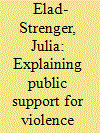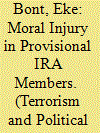|
|
|
Sort Order |
|
|
|
Items / Page
|
|
|
|
|
|
|
| Srl | Item |
| 1 |
ID:
178720


|
|
|
|
|
| Summary/Abstract |
What drives citizens’ support for violence against domestic political actors? Despite its potentially devastating consequences, there is surprisingly little research on the antecedents of this unique form of political violence. Building upon recent insights on the psychological implications of exposure to conflict on support for political violence, we examined the motivations underlying public support for violence against politicians in the context of protracted conflict. Using a two-wave panel design among Jewish-Israelis, we examined the interactive effects of conflict-induced perceived threat, psychological distress, and political orientation on support for violence against politicians. Consistent with previous findings on the psychological implications of conflict, our findings suggest that conflict-induced threat perceptions play an important role in predicting support for violence against politicians. Nevertheless, our findings point to important boundary conditions to these effects: the strength of the relationship between perceived threat and attitudes towards political violence is qualified by the level of chronic conflict-related psychological distress, and the direction of the effects of perceived threat is qualified by individuals’ self-placement on the left-right continuum. More specifically, we found that perceived threat increased rightists’ support and decreases leftists’ support for violence against politicians, only under high, but not low, conflict-related psychological distress. The main conclusion of this study is that support for violence against politicians can be seen as an ideology-driven protective strategy against the negative psychological implications of exposure to violent conflict. By pointing to the importance of understanding the interactive role of psychological and political factors in determining public support for such acts, our findings therefore contribute to the understanding of a relatively understudied phenomenon with potentially catastrophic effects on political stability.
|
|
|
|
|
|
|
|
|
|
|
|
|
|
|
|
| 2 |
ID:
150992


|
|
|
|
|
| Summary/Abstract |
Does ongoing exposure to political violence prompt subject groups to support or oppose compromise in situations of intractable conflict? If so, what is the mechanism underlying these processes? Political scholarship neither offers conclusive arguments nor sufficiently addresses individual-level forms of exposure to violence in the context of political conflict, particularly the factors mediating political outcomes. We address this by looking at the impact of exposure to political violence, psychological distress, perceived threat, and ethos of conflict on support for political compromise. A mediated model is hypothesized whereby exposure to political violence provokes support for the ethos of conflict and hinders support for compromise through perceived psychological distress and perceived national threat. We examined representative samples of two parties to the same conflict: Israelis (N = 781) and Palestinians from Gaza, East Jerusalem, and the West Bank (N = 1,196). The study’s main conclusion is that ethos of conflict serves as a mediating variable in the relationship between exposure to violence and attitudes toward peaceful settlement of the conflict.
|
|
|
|
|
|
|
|
|
|
|
|
|
|
|
|
| 3 |
ID:
188101


|
|
|
|
|
| Summary/Abstract |
Moral injury has recently gained much attention in the field of military psychiatry. However, it has not yet been applied to actors of non-state political violence. Investigating the incidence of moral injury in these populations would increase the understanding of the negative psychological effects of engagement in non-state political violence. This study examined whether moral injury could be applied to former Provisional IRA members who were active during the “Troubles” in Northern Ireland. Nine autobiographical sources from former Provisional IRA members were qualitatively analyzed through interpretative phenomenological analysis. This analysis revealed preliminary evidence of morally injurious experiences and symptoms, and how these symptoms were coped with through reparative actions. There was also evidence of moral disillusionment with the Provisional IRA, and evidence of protective factors that decreased susceptibility to moral injury. The preliminary evidence of moral injury in this population supports the applicability of the concept and indicates that further investigation is warranted.
|
|
|
|
|
|
|
|
|
|
|
|
|
|
|
|
| 4 |
ID:
088415


|
|
|
|
|
| Publication |
2009.
|
| Summary/Abstract |
Does exposure to terrorism lead to hostility toward minorities? Drawing on theories from clinical and social psychology, we propose a stress-based model of political extremism in which psychological distress-which is largely overlooked in political scholarship-and threat perceptions mediate the relationship between exposure to terrorism and attitudes toward minorities. To test the model, a representative sample of 469 Israeli Jewish respondents was interviewed on three occasions at six-month intervals. Structural Equation Modeling indicated that exposure to terrorism predicted psychological distress (t1), which predicted perceived threat from Palestinian citizens of Israel (t2), which, in turn, predicted exclusionist attitudes toward Palestinian citizens of Israel (t3). These findings provide solid evidence and a mechanism for the hypothesis that terrorism introduces nondemocratic attitudes threatening minority rights. It suggests that psychological distress plays an important role in political decision making and should be incorporated in models drawing upon political psychology.
|
|
|
|
|
|
|
|
|
|
|
|
|
|
|
|
| 5 |
ID:
128964


|
|
|
|
|
| Publication |
2014.
|
| Summary/Abstract |
Can endorsement of the ethos of conflict alter psychological effects of exposure to political violence? Israelis and Palestinians have been in a state of political and military turmoil for decades. We interviewed 781 Israelis and 1,196 Palestinians living in the West Bank, Gaza Strip, and East Jerusalem. Using structural equation modeling, we found that among those with a weak adherence to ethos of conflict, exposure predicted higher levels of hatred. For Israelis with a weak adherence to ethos of conflict, exposure predicted higher psychological distress and fear. For Palestinians with weaker adherence to ethos of conflict, stronger exposure predicted stronger threat perceptions. Israelis and Palestinians with a strong adherence to the ethos showed steady and high levels of negative emotions and threat, regardless of exposure. These results indicate that ethos of conflict is a double-edged sword that both protects and protracts the conflict. Although it serves as an engine fueling the conflict, it also plays a meaningful role as an empowering force for people suffering the psychological burden of an ongoing conflict.
|
|
|
|
|
|
|
|
|
|
|
|
|
|
|
|
|
|
|
|
|